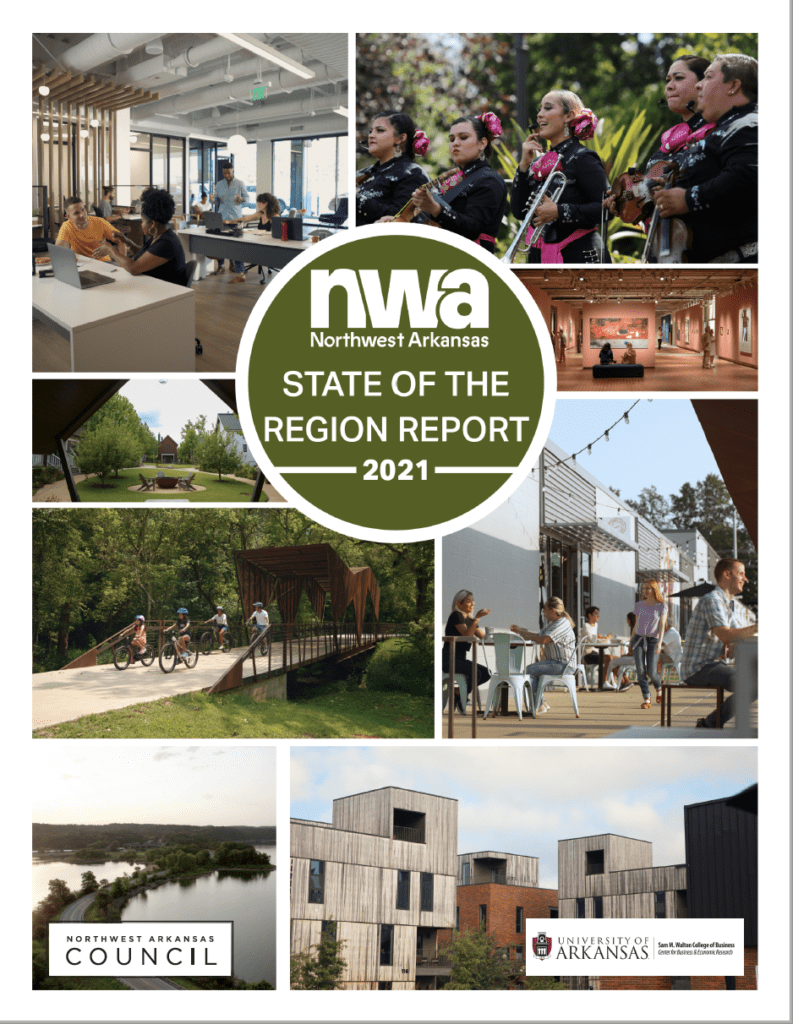Northwest Arkansas’ labor force, average wages and other economic measures have held strong amid the COVID-19 pandemic compared to much of the state and country, a University of Arkansas economist said today during an annual economic briefing.
Northwest Arkansas enjoyed faster population growth and a smaller dip in employment than many high-performing peer regions based on 2019 and 2020 data, said Mervin Jebaraj, director of the university’s Center for Business and Economic Research, as he presented the State of the Northwest Arkansas Region Report on Zoom.
Adequate supply of affordable housing remains a pervasive concern, Jebaraj added, highlighting the urgency of regional action to develop more housing for a variety of incomes. Home prices have risen to record highs in Benton and Washington counties largely because of falling inventories and rising costs of developable land.
The Northwest Arkansas Council has commissioned the university center to assess the state of the region annually for more than a decade. It highlights how Northwest Arkansas compares statistically to six exemplary metropolitan areas across the country: Des Moines, Iowa; Madison, Wisconsin; Austin, Texas; Durham-Chapel Hill, North Carolina; Provo-Orem, Utah; and Raleigh-Cary, North Carolina.
Economists familiar with the comparison have described keeping up with Austin, Des Moines and the other peers as a “stretch goal” for Northwest Arkansas. But its economic measures overall stay in the middle of the pack. Only Austin saw population growth faster than Northwest Arkansas’ 2.4%.
All six peers outpaced the local GDP growth of 0.6%, and most peers have higher average annual wages. But Jebaraj said the average wage increase of 6% from 2019 to 2020 was very strong. The local labor force is larger than it was pre-pandemic, and around 9,000 jobs have been added since January. Northwest Arkansas unemployment has fallen below 3%, similar to pre-pandemic levels.
Local business owners are still wary of the pandemic’s impact and related supply chain and labor issues, with around 40% saying they expect it will take six months or longer to return to normal.
Northwest Arkansas’ domestic airfare remains the highest among the selected regions, but a $374 average ticket price was more than 20% lower than the year before, thanks largely to a significant drop in air travel during the pandemic. Northwest Arkansas National Airport has continued adding low-fare nonstop options over the past few years, such as with Allegiant Air, Breeze Airways and Frontier Airlines. That ticket price puts Northwest Arkansas in the ballpark of several peers for the first time.
The region’s population has grown faster than new housing construction over the past decade, which has pushed Benton and Washington county home prices to around $300,000. Very few homes or apartments are unoccupied, and rising costs affect even smaller communities, especially when taking longer transportation times into account.
The Northwest Arkansas Council and Walton Family Foundation have worked together to create a workforce housing center to support more affordable and accessible housing throughout the region. An executive director and community advisory board for the center are expected to be announced before the end of the year, Council CEO and President Nelson Peacock said.
Keeping housing affordable is crucial to maintaining our quality of life, sense of community and the region’s economy, Peacock said.
Click here to read the full State of the Northwest Arkansas Region 2021 Report.

























